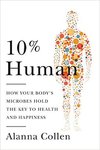

According to Collen, there is a decline in the diversity of our microbiome. Collen presents strong evidence that gastrointestinal symptoms are much more common in people with mental health and neurological disorders such as ADHD, OCD, autism, bipolar disorder, schizophrenia, and even Parkinson's and dementia. There is also increasing evidence that the dramatic rise in autism spectrum disorders may be triggered by changes in children's gut microbiomes.
Only decades ago, the average person had 1600 distinct microbe colonies, which today average just 1200 in number. As scientists discover the unique, complex and important roles each of these microbes play in our bodies, it becomes imperative for us to take this dramatic drop in diversity seriously.
Collen also writes that children born through cesarean section have higher rates of illness, caused by missing out on the bacterial colonization that normally happens as the baby travels through the birth canal.
Even though this research is still in it's infancy, it cannot be overstated how much our physical, emotional and psychological health are impacted by the microbes that inhabit our bodies.
If you have been dealing with brain fog, emotional or psychological disorders, there is a good chance that things have gone awry in your gut. And according to Collen, “The beauty of the microbiota is that, unlike our genes, we have some control over it.”
10% Human provides easy and practical to implement steps you can take to help improve your gut microbiome. In fact, my new perspective from having read this book, is that paying attention to your gut's health should be the first place to start to address any brain related issues.
